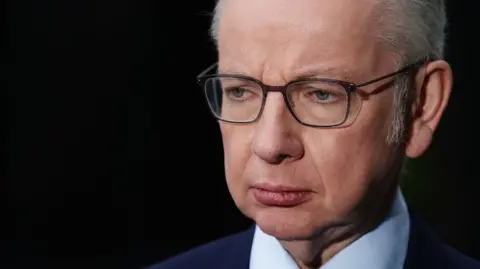The ongoing debate surrounding Scottish independence has once again been thrust into the spotlight, particularly following recent comments made by Michael Gove, a notable figure in the UK government. Gove, who previously held a variety of cabinet roles under three different Conservative prime ministers from 2010 to 2024, recently expressed a position that aligns him, surprisingly, with Scotland’s First Minister, John Swinney, regarding the conditions under which a second independence referendum could take place.
In a conversation with BBC Scotland on The Sunday Show, Gove asserted that while he does not believe another referendum is currently necessary, he remains open to the idea if there is “overwhelming support” among the populace for such a vote. He emphasized that as the political landscape evolves and if the Scottish National Party (SNP) continues to gain traction, the UK government might need to reassess its stance. Gove’s nuanced position reflects the changing dynamics of Scottish politics, where SNP’s popularity can influence conversations about independence.
John Swinney had previously highlighted the need for what he describes as “demonstrable support” for independence, drawing a comparison to the 1997 referendum campaign for a Scottish parliament, which garnered support from approximately 74% of the public. Gove perceives a potential second referendum not merely as a possibility but as a contingent plan hinging on how well the SNP manages to address public concerns surrounding essential services and governance.
During his tenure, Gove was instrumental in facilitating discussions between Scottish and UK governments. While he maintains that independence is not an immediate concern, he warns against complacency among unionists. He painted the UK as a “living thing,” indicating that ongoing effort is required to establish and emphasize the benefits of the union. According to Gove, should there be significant public demand for a referendum, the Westminster government might reconsider its earlier stances.
Nonetheless, Gove opines that too much focus on constitutional debates can detract from critical issues such as health and the economy. He believes that Scottish Affairs must shift toward fostering confidence in the governance offered by both the Scottish and UK governments.
A notable point of contention arose when Gove’s government refused to grant the Scottish government consent for a second referendum, a situation he does not deem anti-democratic. He argues that the Scottish populace needs to focus on pressing issues beyond independence for the time being and asserts that how well the SNP governs could decide the viability of a future referendum.
Interestingly, Gove and Swinney, despite their contrasting political affiliations, both exhibit a shared understanding that genuine public support could dictate the trajectory of independence discussions. Gove acknowledges that the SNP’s ability to demonstrate competence in governance could either bolster or weaken the case for a referendum in the future.
Moreover, Gove has faced criticisms regarding the UK government’s interventions in Scottish affairs, including the controversial decision to veto the Scottish government’s Gender Recognition Reform bill. Gove maintains that this action was justified, reinforcing his belief that it upheld boundaries defined by Westminster over similar reserved laws. The complexities of this relationship are indicative of the broader tensions inherent in Scottish-UK governance discussions.
As Gove prepares to take up his position in the House of Lords, now officially titled Lord Gove of Torry—a nod to the area with which his family has historic ties—his focus appears to blend a mix of practical governance and political strategy. He advises party members to stay united and steady amidst challenging electoral forecasts, particularly with the emergence of potential rival parties that could threaten the Scottish Conservatives’ standing in future elections.
Through Gove’s commentary and proactive engagement with the question of Scottish independence, it becomes clear that a combination of political savvy and public sentiment will shape how matters unfold for Scotland. While both he and Swinney seem to navigate this politically charged environment with caution, the aspirations of the Scottish people may ultimately dictate the future of their governance and autonomy.



